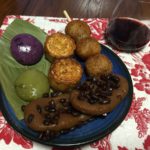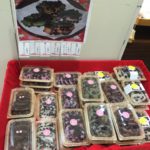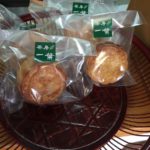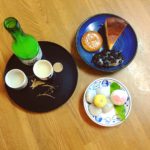Tsuki-mi means “moon-watching,” tsuki= moon and mi= to watch/see. You will also hear moon-viewing festivals referred to as uchichiumachii ウチチウマチー(お月お祭り) in Okinawa language.
There are 2x you are supposed to view the full moon in Japanese culture. The first is Jugoya 十五夜 (also romanized Juugoya, translation “15th night”), held on August 15 of the lunar calendar; in Okinawan it is called Juuguya じゅーぐや. You may also often see it referred to as 中秋の名月 chuushuu no meigetsu, Mid-autumn moon festival or harvest festival. The second is Jusanya 十三夜 (also romanized Juusanya, translation “13th night”), September 13 of the lunar calendar. Jusanya is also referred to as 後の月 nochi no tsuki (later moon). It is often thought to bring bad luck to celebrate only Jugoya, since the 2 moon-viewing days are related.
In Okinawa, there are some special types of “mooncakes” called fuchagi ふちゃぎ, that are eaten. It is mochi, a.k.a. “rice cakes” (possibly flavored with brown sugar, yomogi/mugwort, beniimo, or just plain) covered in azuki beans. I will add more posts about beans in the future, but basically beans are known to drive out or keep away demons (oni 鬼). I have no real good idea as to why beans hold such mystical powers, but almost every holiday or celebration involves beans in some way.
For my celebration, I mixed in a little Chinese mooncakes, as well as Okinawan fuchagi, and Japanese dango 団子. Very multi-cultural. I also drank some wine, set up some pampas (susuki ススキ) grass, but did not write any poetry (haiku 俳句)… sorry Moon.
There is also a children’s song; Japanese people believe you can see a rabbit pounding mochi in the moon. The song and translation is something like this:
うさぎ うさぎ Rabbit, rabbit うさぎ うさぎ Rabbit, rabbit 何見て はねる What are you watching while hopping/leaping around? 十五夜お月さま The Juugoya moon 見てはねる is what I watch while hopping/leaping around!
In Itoman, a large Tug-of-War (tsunahiki) is held on Juugoya; many places will have lion dances 獅子舞 (shishimai) or other festive events, such as hounen-matsuri 豊年祭 (Harvest festivals), during this time of year, to celebrate the moon, the changing of seasons, and harvest time.
Shuri-jo holds a Mid-Autumn banquet (Chuushuu no utage 中秋の宴) festival around Juugoya and Autumn Equinox. During the era of the Ryukyu Kingdom, a banquet was held to entertain the Chinese emperor envoys, and today a moon-viewing party reenacts the “Mid-Autumn Banquet” in the present day. There is a parade, and a King and Queen contest is held. At this festival, you can see kumiodori (traditional Ryukyuan dance), beautiful costumes, and traditional music, as the castle is lit up at night.
In Okinawa, Juugoya is also falls on one of the days for taking care of the family hinukan (read more on the link).




7 thoughts on “Tsukimi: 月見”
Comments are closed.